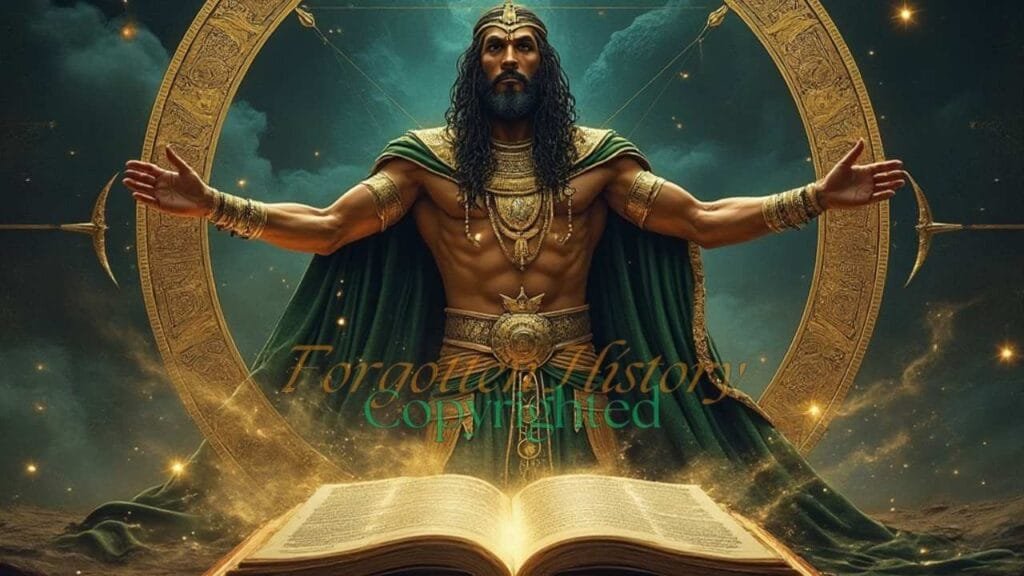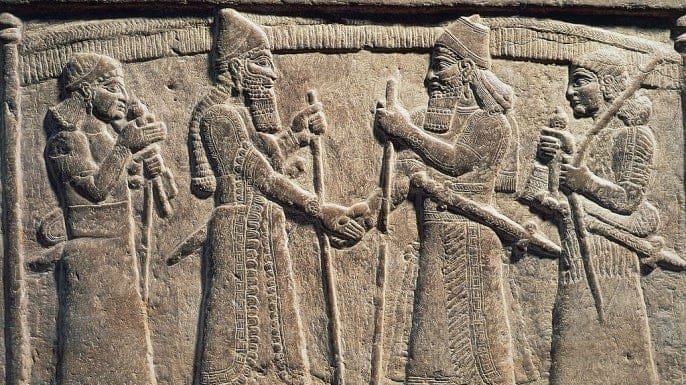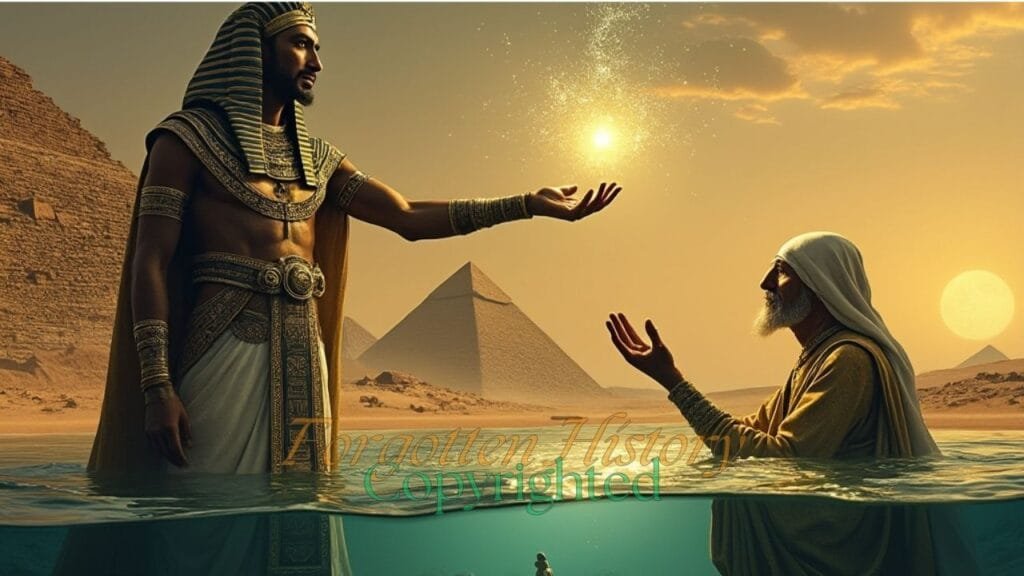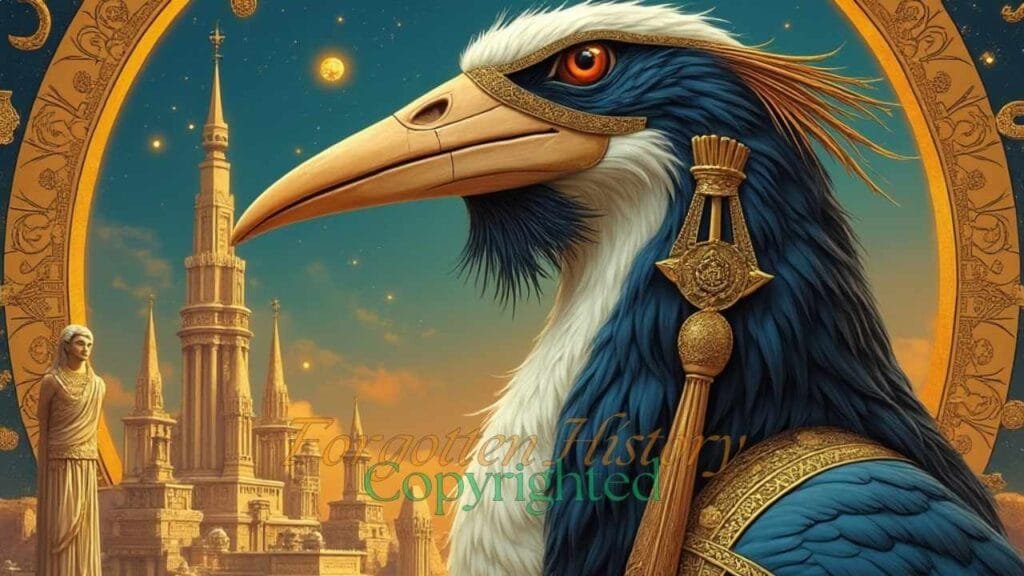Listen to This Post
Introduction to who is thoth the Atlantean
Thoth was a prominent deity in ancient Egyptian mythology, revered as the Keeper of Mysteries. He was associated with the moon, wisdom, sacred texts, mathematics, science, and magic. Serving as both messenger and scribe of the gods, Thoth was considered the master of knowledge and the patron of scribes. Known in Egyptian as Djehuty, meaning “He who is like the Ibis,” he was commonly depicted either as an ibis or a baboon

Thoth the Atlantean is a fascinating figure in ancient mythology. He is known as the god of wisdom, writing, and knowledge. Many people are captivated by his story and teachings. Scholars and enthusiasts alike find his connections to history intriguing.
As a deity, Thoth embodies intelligence and eloquence. He is often depicted with the head of an ibis or a baboon. These animals symbolize his wisdom and significance in Egyptian culture.
Thoth plays a vital role in the ancient Egyptian pantheon. He serves as a mediator between the divine and mortal realms. Many believe he helps humans communicate with the gods. He also records important events in human history.
Thoth is the keeper of sacred knowledge. He holds deep insights into life, death, and the cosmos. His role includes judging souls in the afterlife. He records each soul’s fate as their heart is weighed against the feather of Ma’at. This feather represents truth and justice.
The mystique of Thoth grows when we link him to Atlantis. Atlantis often symbolizes advanced knowledge and spiritual insight. This connection suggests that Thoth’s wisdom may have roots in this legendary land. Thoth’s identity bridges the divine and human realms. This invites exploration of his dual nature and significance.
Thoth is more than just a solitary deity. He embodies the power of knowledge and echoes the legacy of ancient civilizations. Our enduring fascination with Thoth the Atlantean reflects humanity’s timeless pursuit of wisdom.
Thoth’s Origins and Mythological Background

Thoth has a rich mythological origin. Many accounts say he emerged from Nun’s primordial waters. Nun represents the cosmic abyss that existed before creation. His emergence symbolizes the birth of knowledge and order.
Thoth is commonly known as the son of Ra. This duality highlights his power and places him at the crossroads of cosmic forces. He plays a crucial role in creating the world and maintaining its order. Thoth embodies Ma’at, representing truth, balance, and cosmic order.
In many myths, Thoth contributes to humanity’s creation. He shapes beings from divine materials and grants them knowledge. His influence extends beyond creation; he is credited with inventing writing. Writing helps preserve laws and knowledge for future generations.
Thoth’s role in the afterlife is equally significant. He guides souls through the weighing of the heart ceremony. This ceremony ensures that a person’s journey to immortality aligns with truth. In this ceremony, the heart of the deceased is weighed against the feather of Ma’at. The outcome determines if they are worthy of entering the realm of the blessed.
These stories reveal Thoth as more than a deity of wisdom. He represents core principles of life and the afterlife in ancient Egyptian culture. His teachings continue to inspire people today as they seek understanding of existence.
The Emerald Tablets: Secrets of Ancient Wisdom

The Emerald Tablets are linked to Thoth the Atlantean. These tablets captivate scholars, philosophers, and spiritual seekers. They originated in ancient Egypt and hold symbols and texts that reveal universal truths.
The most famous tablet is the “Emerald Tablet of Thoth.” It describes how to transform base metals into gold. Many interpret this transformation as a metaphor for spiritual enlightenment and personal growth.
Historical accounts suggest these tablets trace back to Atlantis. This civilization allegedly held advanced knowledge of metaphysics and alchemy. Thoth’s wisdom is said to be recorded in these tablets.

The writings within the tablets often address principles of duality. They explore the nature of reality and the interconnectedness of all things. These themes resonate throughout various spiritual traditions. They demonstrate the tablets’ lasting impact on thought across different eras.
Interpretation of the Emerald Tablets varies significantly over time. Renaissance thinkers, such as Hermes Trismegistus, merged their teachings with Hellenistic philosophy. This resulted in the Hermetic tradition, which continues to influence esoteric practices.
Scholars highlight the symbolic language in the tablets. They suggest that understanding these teachings requires an inner journey. Deep contemplation often leads to insight and wisdom.
The tablets emphasize self-mastery and enlightenment. They suggest that true knowledge is accessible only to those who seek it sincerely. The teachings of Thoth advocate for a transformative process. Individuals can elevate their consciousness to align with higher truths.
This noble pursuit inspires countless people seeking understanding beyond the material realm. Exploring these ancient teachings can lead to personal transformation.
In conclusion, the Emerald Tablets encapsulate the mystical legacy of Thoth the Atlantean. They serve as a bridge connecting ancient wisdom to modern spiritual inquiry. The profound insights they offer continue to ignite curiosity and foster exploration into the depths of human existence.
Thoth’s Dual Role: The Divine Scribe and Judge of the Dead

Thoth holds a unique position as the divine scribe and judge of the dead. His complex identity significantly influences ancient Egyptian spiritual practices. Thoth intertwines the realms of life and death, creating harmony.
As the divine scribe, he often appears with a writing palette and stylus. These symbols represent his authority over knowledge and language. Thoth records the deeds of humanity. He chronicles actions taken during one’s lifetime.
This record-keeping serves as a fundamental aspect of moral order. Each individual’s life is evaluated based on their choices. Through his divine oversight, Thoth ensures that Ma’at’s principles are upheld.
Thoth’s writings encompass both the mundane affairs of mortals and the grand narratives of the gods. This reinforces his significance as a guardian of wisdom and history. He keeps a record of all significant events and decisions made by humanity.
Thoth’s role transforms when one passes into the afterlife. He becomes the judge of the dead, guiding souls through their final journey. The weighing of the heart ceremony is a pivotal moment for the deceased.
In this ceremony, the heart of the departed is weighed against the feather of Ma’at. The feather symbolizes truth and justice. The outcome determines the individual’s fate in the afterlife. Those found worthy enter the realm of the blessed. Those deemed unworthy face annihilation.
As the arbiter of this critical judgment, Thoth underscores the importance of righteousness. He guides souls toward their ultimate fate. His dual role as the divine scribe and judge of the dead highlights his essential function. Thoth embodies the pursuit of knowledge and the administration of cosmic justice.
His contributions to ancient Egyptian spirituality are profound. They remind us of the interconnectedness between life and the afterlife. Through Thoth, ancient Egyptians sought understanding and reassurance about their place in the universe.
Thoth’s Symbolism: The Ibis and Baboon

Thoth closely links with two iconic animals: the ibis and the baboon. These creatures symbolize Thoth’s attributes and his important role in Egyptian mythology.
The ibis, with its long, curved beak, resembles a writing tool. This connection symbolizes Thoth’s relationship with literacy and divine intellect. The bird is associated with the Nile’s inundation, vital for agriculture. This event symbolizes fertility and life’s renewal.
The ibis in Thoth’s imagery highlights his wisdom. It represents the transformative power of knowledge. This emphasis reinforces a narrative of growth and enlightenment in Egyptian culture.
The baboon represents the dual aspects of knowledge in ancient Egyptian society. Known for cleverness and social behavior, this animal reflects intelligence and communication. The baboon often appears in ancient art, depicted in thoughtful poses or vibrant interactions.
These depictions reinforce the importance of community and the spread of wisdom. The association with Thoth suggests a guardian role. Baboons embody alertness and the ability to rise above the mundane.
Together, the ibis and baboon symbolize the balance between spiritual wisdom and practical knowledge. They encapsulate Thoth’s legacy as a powerful figure of intellect and enlightenment. In Egyptian lore, these animals highlight Thoth’s attributes. They serve as lasting symbols of wisdom, urging individuals to seek enlightenment.
This connection remains significant in discussions about wisdom across cultures. The ibis and baboon inspire respect for knowledge and its transformative power.
Thoth’s Influence on Spiritual Practices

Thoth greatly influences ancient Egyptian spiritual practices. He is revered as a divine figure in their spiritual paradigm. As the god of wisdom, knowledge, and writing, Thoth’s teachings permeated ancient Egyptian society.
His association with writing led to creating many texts. These texts served as essential resources for spiritual instruction and guidance. They helped individuals understand their beliefs and practices.
One notable contribution of Thoth is in the field of magic. Ancient Egyptians often invoked Thoth’s name in magical practices. They believed that his wisdom could enhance the effectiveness of their spells. Thoth’s presence offered divine protection and ensured the connection between practitioners and the spiritual realm.
Additionally, Thoth’s teachings emphasized self-examination and introspection. Individuals were encouraged to seek knowledge and understanding of themselves. This pursuit allowed them to navigate the complexities of life.
The festivals honoring Thoth, like the “Feast of Thoth,” celebrated his wisdom and achievements. These festivals included rituals, offerings, and communal gatherings. They reinforced the significance of Thoth in the lives of the ancient Egyptians.
Thoth’s influence extended beyond ancient Egypt. He inspired various philosophical and spiritual traditions worldwide. His teachings resonated in the works of later scholars and thinkers. Many adopted Thoth’s principles in their practices.
The impact of Thoth on Western esotericism is particularly noteworthy. His figure merges with that of Hermes in Greco-Roman thought. This synthesis led to the development of Hermeticism. Hermeticism emphasizes the quest for wisdom and the pursuit of truth, echoing Thoth’s teachings.
Today, Thoth’s legacy continues to inspire spiritual seekers. Individuals exploring their consciousness often draw on his wisdom. Thoth invites people to pursue knowledge, understanding, and personal transformation. His influence serves as a reminder of the timeless quest for wisdom.
Conclusion: The Legacy of Thoth the Atlantean

Thoth the Atlantean embodies a rich tapestry of wisdom and spiritual enlightenment. His legacy spans centuries, captivating many. From his origins as a primordial deity to his dual role as a divine scribe, Thoth holds a significant place in ancient Egyptian mythology.
The Emerald Tablets, attributed to Thoth, continue to spark curiosity and inspire seekers of truth. These teachings emphasize self-discovery and spiritual transformation. They invite individuals to embark on their journey toward enlightenment.
Thoth’s symbolic representations, such as the ibis and baboon, reflect the connection between wisdom and nature. These symbols resonate with those seeking to explore the depths of knowledge.
Moreover, Thoth’s influence transcends time and geography. His teachings continue to resonate in contemporary spiritual practices and philosophies. They remind us of the timeless pursuit of wisdom and the interconnectedness of all life.
In the quest for knowledge and understanding, Thoth serves as a guiding light. His legacy encourages individuals to seek truth, challenge their perceptions, and embrace their spiritual journeys. As we navigate the complexities of existence, Thoth remains a symbol of the quest for knowledge and enlightenment.
Through the lens of Thoth the Atlantean, we reflect on our pursuit of wisdom. His teachings inspire us to explore the mysteries of life and our place within it. Thoth invites us to remember that knowledge is a journey of discovery, growth, and transformation.
To learn more about the ancient past click HERE
Pingback: The Emerald Tablets Explained: A Guide to Thoth's Teachings
Pingback: Who Were the Anunnaki?: The Gods of Ancient Sumeria
Pingback: The Scroll of Thoth Origins and Mystical Significance
Pingback: The Book of Thoth: Ancient Secrets and Forbidden Wisdom
Pingback: Was the Great Pyramid Once Underwater - New theory
Pingback: A Line-by-Line Breakdown of Thoth Emerald Tablets. - Forgotten-Histories.com
Pingback: Who is Enki? The Anunnaki god of Wisdom and Compassion